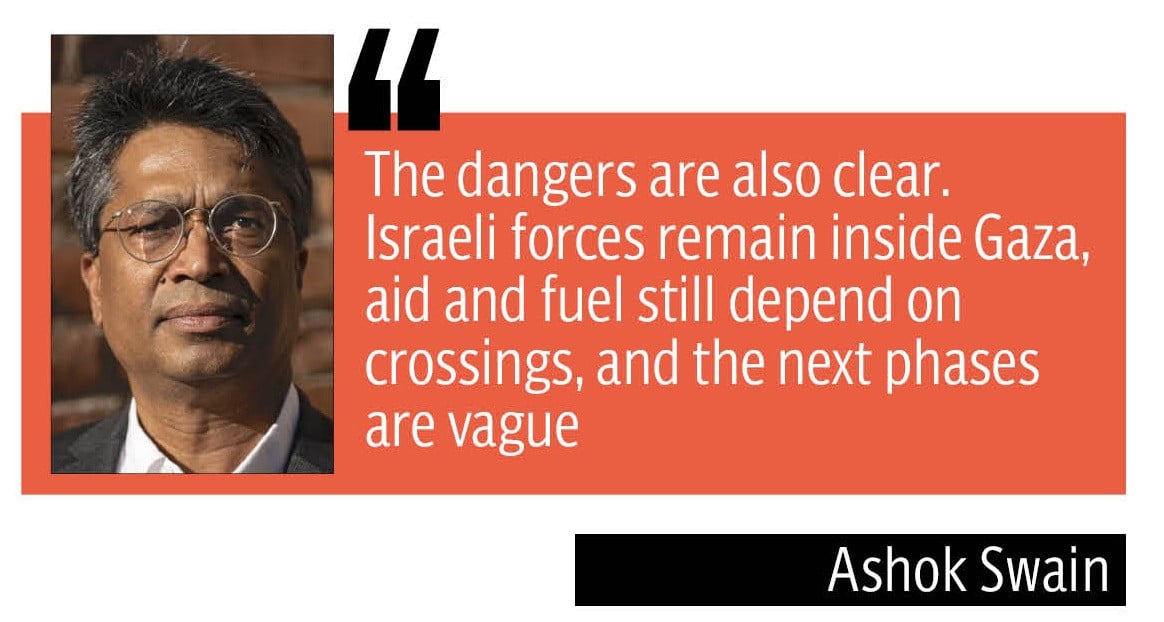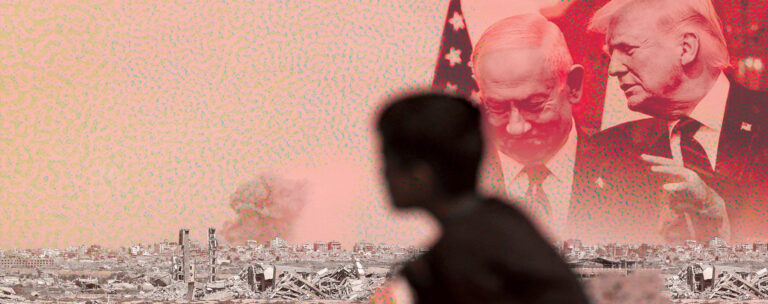After three years of unrelenting assault by Israel’s Defence Forces, Palestinians, in Gaza, hold only a faint hope of peace. What began in the aftermath of a Hamas attack on Israel has since become a prolonged campaign of vengeance, led by Benjamin Netanyahu, who has seized every opportunity to unleash bombardment upon the densely populated strip. More than 67,000 Palestinians have been killed — nearly a third of them children. Independent relief agencies say the true toll is far higher, and a recent panel led by the United Nations’ Navi Pillay has declared Israel’s actions in Gaza to amount to genocide.
Over the course of the conflict, neighborhoods that once bustled with markets, schools, and homes have been reduced to rubble. Hospitals have been repeatedly struck, and electricity and water remain scarce. Families live in fear not only of airstrikes but of the slow, grinding effects of siege — shortages of food, medicine, and fuel that make survival itself a daily struggle. Over 700,000 people have been displaced, many now crammed into temporary shelters or makeshift camps, where disease and malnutrition compound the trauma. Even while Gaza has endured relentless bombing, its residents have found ways to preserve semblances of community — underground clinics, improvised schools, and local initiatives to provide food to those most in need.
Now, for the first time since 2023, the guns have briefly fallen silent. The commencement of the ceasefire, according to the BBC, has triggered a tense 72-hour countdown — a race against time in which Hamas must release 20 remaining hostages believed to be alive. They are to be handed over by noon on October 13 under the supervision of the Red Cross, which will transfer them to Israel for medical checks before they are reunited with their families. The bodies of those who died in captivity will also be returned, though it remains unclear how long that process will take.
In return for Hamas handing over hostages, an outcome that casts a shadow of uncertainty over Gaza, Israel is expected to release roughly 250 Palestinian prisoners serving life sentences, along with 1,700 detainees from the territory. Officials have not published the full list, though they confirmed that Marwan Barghouti, the most prominent Palestinian political prisoner, will not be included. For Palestinians and their families, the release of these prisoners offers a brief flicker of hope amid years of confinement and loss.
Meanwhile, humanitarian aid is being increased to unprecedented levels. Roughly 600 trucks a day are expected to enter Gaza, bringing food, medical supplies, and fuel. The United Nations had previously declared a famine in parts of the territory, noting that over half a million people were facing “catastrophic” conditions characterized by starvation, destitution, and death. The daily arrival of aid will relieve immediate suffering, but it does not address the underlying structural blockade or the uncertainty surrounding borders, crossings, and basic freedoms.
To safeguard the fragile truce, a multinational contingent of roughly 200 troops, overseen by the US military, has been tasked with monitoring the ceasefire.Troops from Egypt, Qatar, Turkey, and the United Arab Emirates will form the contingent, tasked with observing, verifying, and preventing violations. Washington has been clear that no US forces will set foot inside Gaza, leaving the onus on regional powers. At the same time, Israel has begun repositioning troops along the line detailed in the agreement, maintaining control over 53% of Gaza. A White House map suggests this is the first of three stages of withdrawal, each linked to later phases of Donald Trump’s so-called peace plan.
For now, Gaza breathes under a thin pause — a silence that carries both exhaustion and dread. Few believe this ceasefire marks an end – most understand it as an interlude in a war that has already rewritten the boundaries of suffering. In the narrow streets of Gaza City, children play near the ruins of their schools, vendors try to reopen shops, and families measure each day’s survival in food rations and the flicker of electricity. Experts describe it as a fragile existence, where hope and fear coexist in equal measure.
Justice might be traded for speed
While the new ceasefire and phased pullback are being framed as a diplomatic breakthrough, Dr Ashok Swain, professor of peace and conflict research at Sweden’s Uppsala University , cautions that the deal could allow Prime Minister Netanyahu to evade accountability for the atrocities he has committed in Gaza.

“The ceasefire and pullback are good first steps,” he says, “but the plan can still trade justice for speed. Israel keeps control of large parts of Gaza at first, the timeline for full withdrawal is unclear, and Netanyahu says demilitarisation is not open to negotiation.”
Unless the plan clearly mandates cooperation with international law and investigators, Swain says, Netanyahu and his associates can tout progress while court cases and evidence-gathering quietly fade.
Swain’s warning cuts to the core of the plan’s contradictions – it offers calm but risks erasing the crimes that produced the conflict in the first place. If international legal mechanisms, including the ICC, are sidelined, the narrative of progress could obscure the reality of impunity. The ceasefire could be hailed as a success while evidence collection, prosecutions, and justice slowly dissipate into bureaucratic limbo.
Last month, a United Nations commission of inquiry concluded that Israel has committed genocide against Palestinians in Gaza. The report found reasonable grounds to believe that four of the five genocidal acts defined under international law have been carried out since the start of the war with Hamas three years ago – killing members of a group, causing them serious bodily and mental harm, deliberately inflicting conditions calculated to destroy the group, and preventing births. It cites statements by Israeli leaders and the documented pattern of conduct by Israeli forces as evidence of genocidal intent.
Relief and Risk for Gaza’s People
For Palestinians inside Gaza, the ceasefire brings immediate respite — but also new uncertainties. “People in Gaza may get real relief at once,” Swain notes. “Bombs stop, aid rises, prisoners come home, and some families return north. The dangers are also clear. Israeli forces remain inside Gaza, aid and fuel still depend on crossings, and the next phases are vague.”
Daily life, however, remains a precarious balancing act. Many families face overcrowded shelters, limited access to clean water, and intermittent medical care. Electricity may be restored only for a few hours a day, and fuel shortages continue to disrupt transport and emergency services. Even as relief begins to flow, the psychological trauma of constant bombardment lingers. Children exhibit symptoms of anxiety and PTSD, parents grapple with the grief of lost relatives, and communities struggle to rebuild amid the rubble.
Swain fears the truce could devolve into a managed stagnation rather than a path to freedom. “A single dispute over hostages, weapons, or who governs can break the pause,” he says. “My worst fear is a long limbo with fewer airstrikes but no rights, no real return to homes, and a chain of crowded camps that become the new normal.”
The Sweden-based expert points to the tension between humanitarian relief and political resolution: stopping bombs and delivering aid are essential, but without structural changes, Gaza remains trapped in an incomplete ceasefire that may only delay future conflict.
For the Palestinians, but without them
The peace plan has been crafted largely outside Palestine’s borders. While it may be presented as benefiting Palestinians, it proceeds largely without their input or say. “The plan looks mostly designed outside Palestine,” says Swain, “with Egypt, Qatar, Türkiye, Saudi Arabia and the UAE acting as monitors and fixers. That is helpful but it is not real inclusion.”
Regional powers have played a decisive role in securing the temporary truce, but their influence cannot replace genuine Palestinian participation. “Palestinians must lead decisions on who governs, when troops leave, how people move, and how rebuilding works,” Swain adds. “The region should use its leverage for clear deadlines, full withdrawal, open crossings, and binding protection of basic rights.”
The exclusion of Palestinians from meaningful negotiations, combined with the continued military presence, risks creating a ceasefire that is imposed from outside rather than accepted locally. Without self-determination, Gaza’s population may find that relief arrives in doses while their broader rights remain constrained. The sidelining is so pronounced that US President Trump reportedly considered installing former prime minister Tony Blair to lead an independent authority in Gaza — a plan, like all others, conceived without Palestinian representation. Blair’s involvement is already controversial, given his role in at least two deadly wars during his tenure.
A dangerous precedent
The question is not whether Netanyahu will evade responsibility for genocide, but what precedent it would create if he did. So far, no nation on earth has complied with the ICC arrest warrant for Israel’s leadership. About the moral ramifications, Swain is particularly concerned. “There is a serious risk of a bad example,” he cautions. “If a peace deal follows genocide and focuses on quiet and aid while justice waits, others may learn that massive force can change facts on the ground and later the world will pay to rebuild. To prevent that, the plan must include evidence protection, screening of security forces, reparations, and firm rules against impunity from the start.”
Test for international institutions
For international bodies that have already recognised the scale of Israel’s crimes, the peace process poses a defining challenge. The International Criminal Court has already issued arrest warrants for Netanyahyu but no country has arrested him. Critics of Israel, such as Anthony Albanese, the US special rapporteur on Palestine, have even been subjected to sanctions. “If the deal sidelines the findings of UN bodies that named the crimes and ignores the warrants from the ICC, it will hurt the standing of those institutions,” Swain says. “The reverse is also possible. If later phases require full access for UN teams, cooperation with courts, and no backsliding on legal cases, then diplomacy and law can work together.”
Whether global justice holds its ground or retreats behind diplomatic convenience will determine not only Gaza’s fate but the credibility of international law itself. The proof, Swain adds, will be whether withdrawal, governance, and reconstruction money depend on real cooperation with these legal tracks.
The next war
The ongoing war in Gaza is certainly not the last conflict. Even as the Palestinian enclave experiences a pause in violence, Swain cautions against mistaking the absence of bombs for the presence of peace. “My main fears are these,” he says. “The pause drifts into quiet pressure under a lasting military footprint; talks focus on hostages while civilian safety slips – a technocrat fix without local consent becomes a new blockade system; aid surges for a few days, then stalls at checkpoints; violence in the West Bank grows as the world looks only at Gaza and a claim of mission complete leaves Palestinians without real self-rule, refugees without return or compensation, and victims without justice.”
“That would plant the seeds of the next war, not just peace,” Swain cautions, echoing what many Palestinians already suspect.
Across Gaza, these warnings are reflected in daily life. Experts say families measure survival in meals, electricity, and safety – children navigate streets littered with debris, while entire communities grapple with a truce that could end as abruptly as it began. Even as Trump and other leaders convene in the Middle East, analysts warn that the ceasefire will remain fragile, and the broader struggle — for justice, rights, and self-determination — is far from resolved.

